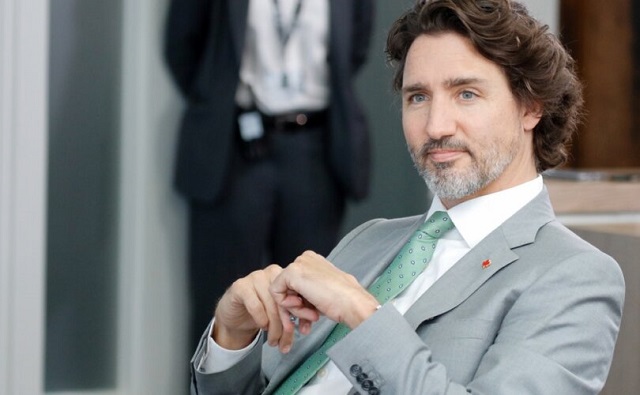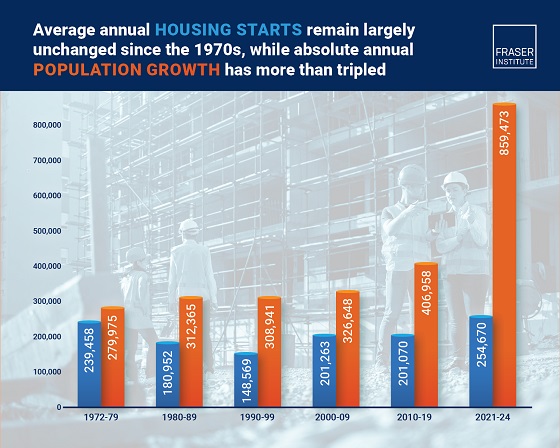Housing
Trudeau admits immigration too much for Canada to ‘absorb’ but keeps target at record high

From LifeSiteNews
Despite his admission that the influx of people has outpaced Canada’s ability to sustain itself, Trudeau said he is committed to continuing his government’s plan to bring in 500,000 permanent immigrants each year.
Prime Minister Justin Trudeau has admitted that his mass immigration policies have driven Canadians’ wages down and attributed to the housing crisis, but he still insists on bringing in hundreds of thousands of people each year.
During an April 2 media conference in Dartmouth, Nova Scotia, Trudeau acknowledged that his immigration policies have negatively affected Canadians after a journalist questioned him on how his policies have contributed to record high unaffordability in the nation.
“Over the past few years, we’ve seen a massive spike in temporary immigration, whether it’s temporary foreign workers or whether it’s international students in particular that have grown at a rate far beyond what Canada has been able to absorb,” he admitted.
PM Trudeau says immigration to Canada has "grown at a rate far beyond what Canada has been able to absorb," adding that "temporary immigration has caused so much pressure in our communities," in relation to housing #cdnpoli pic.twitter.com/3ASFufZKID
— Mackenzie Gray (@Gray_Mackenzie) April 2, 2024
“To give an example, in 2017, two per cent of Canada’s population was made up of temporary immigrants,” Trudeau continued. “Now we’re at 7.5 per cent of our population comprised of temporary immigrants. That’s something we need to get back under control.”
Amid heckling from protestors, Trudeau acknowledged that the immigration crisis must be solved. However, he attributed the negative effects only to the spike in “temporary” immigrants, who he claims are “putting pressure on our communities.”
“That’s something that we need to get back under control, both for the benefit of those people because international students we’re seeing increasingly vulnerable to mental health challenges, to not being able to thrive and get the education they want,” he stated.
“But also, increasingly more and more businesses [are] relying on temporary foreign workers in a way that is driving down wages in some sectors,” Trudeau continued.
Despite the admission, Trudeau announced that he still plans to bring in permanent immigrants at a record pace, despite Canadians struggling to afford homes and even food.
“Every year, we bring in about 450,000, now close to 500,000, permanent residents a year, and that is part of the necessary growth of Canada,” he insisted. “It benefits our citizens, our communities, it benefits our economy.”
While Trudeau remains insistent that mass immigration “benefits” the economy, recent figures show that the nation’s GDP per capita growth rate is dismal compared to other countries with lower relative immigration levels like the United States.
The Bank of Canada has even gone as far as saying that the weakening productivity of the nation’s economy has become “an emergency.”
In March, Canada reached a population of 41 million, just 9 months after hitting the 40 million mark. Such growth is unprecedented in recent history and among the highest immigration rates in the world.
Trudeau’s acknowledgment comes as a recent report found that Canada is one of the unhappiest places in the West for people in their 20s as young Canadians are experiencing the effects of Trudeau’s government, which has been criticized for its overspending, onerous climate regulations, lax immigration policies, and “woke” politics.
Additionally, a March poll revealed that seven out of 10 Canadians believe the country is broken and that the Trudeau government does not focus on issues that matter.
Furthermore, many have pointed out that considering rising home prices, many Canadians under 30 are at risk of never being able to purchase a home.
2025 Federal Election
Homebuilding in Canada stalls despite population explosion

From the Fraser Institute
By Austin Thompson and Steven Globerman
Between 1972 and 2019, Canada’s population increased by 1.8 residents for every new housing unit started compared to 3.9 new residents in 2024. In other words, Canada must now house more than twice as many new residents per new housing unit as it did during the five decades prior to the pandemic
In many parts of Canada, the housing affordability crisis continues with no end in sight. And many Canadians, priced out of the housing market or struggling to afford rent increases, are left wondering how much longer this will continue.
Simply put, too few housing units are being built for the country’s rapidly growing population, which has exploded due to record-high levels of immigration and the federal government’s residency policies.
As noted in a new study published by the Fraser Institute, the country added an all-time high 1.2 million new residents in 2023—more than double the previous record in 2019—and another 951,000 new residents in 2024. Altogether, Canada’s population has grown by about 3 million people since 2022—roughly matching the total population increase during the 1990s.
Meanwhile, homebuilding isn’t keeping up. In 2024, construction started on roughly 245,000 new housing units nationwide—down from a recent peak of 272,000 in 2021. By contrast, in the 1970s construction started on more than 240,000 housing units (on average) per year—when Canada’s population grew by approximately 280,000 people annually.
In fact, between 1972 and 2019, Canada’s population increased by 1.8 residents for every new housing unit started compared to 3.9 new residents in 2024. In other words, Canada must now house more than twice as many new residents per new housing unit as it did during the five decades prior to the pandemic. And of course, housing follows the laws of supply and demand—when a lot more prospective buyers and renters chase a limited supply of new homes, prices increase.
This key insight should guide the policy responses from all levels of government.
For example, the next federal government—whoever that may be—should avoid policies that merely fuel housing demand such as home savings accounts. And provincial governments (including in Ontario and British Columbia) should scrap any policies that discourage new housing supply such as rent controls, which reduce incentives to build rental housing. At the municipal level, governments across the country should ensure that permit approval timelines and building fees do not discourage builders from breaking ground. Increasing housing supply is, however, only part of the solution. The next federal government should craft immigration and residency policies so population growth doesn’t overwhelm available housing supply, driving up costs for Canadians.
It’s hard to predict how long Canada’s housing affordability crisis will last. But without more homebuilding, slower population growth, or both, there’s little reason to expect affordability woes to subside anytime soon.
2025 Federal Election
Housing starts unchanged since 1970s, while Canadian population growth has more than tripled

From the Fraser Institute
By: Austin Thompson and Steven Globerman
The annual number of new homes being built in Canada in recent years is virtually the same as it was in the 1970s, despite annual population growth
now being three times higher, finds a new study published today by the Fraser Institute, an independent, non-partisan Canadian public policy think tank.
“Despite unprecedented levels of immigration-driven population growth following the COVID-19 pandemic, Canada has failed to ramp up homebuilding sufficiently to meet housing demand,” said Steven Globerman, Fraser Institute senior fellow and co-author of The Crisis in Housing Affordability: Population Growth and Housing Starts 1972–2024.
Between 2021 and 2024, Canada’s population grew by an average of 859,473 people per year, while only 254,670 new housing units were started annually. From 1972 to 1979, a similar number of new housing units were built—239,458—despite the population only growing by 279,975 people a year.
As a result, more new residents are competing for each new home than in the past, which is driving up housing costs.
“The evidence is clear—population growth has been outpacing housing construction for decades, with predictable results,” Globerman said.
“Unless there is a substantial acceleration in homebuilding, a slowdown in population growth, or both, Canada’s housing affordability crisis is unlikely to improve.”
The Crisis in Housing Affordability: Population Growth and Housing Starts 1972–2024
- Canada experienced unprecedented population growth following the COVID-19 pandemic without a commensurately large increase in new homebuilding.
- The imbalance between population growth and new housing construction is reflected in a significant gap between housing demand and supply, which is driving up housing costs.
- Canada’s population grew by a record 1.23 million new residents in 2023 almost entirely due to immigration. That growth was more than double the pre-pandemic record set in 2019.
- Population growth slowed to 951,517 in 2024, still well above any year before 2023.
- Nationally, construction began on about 245,367 new housing units in 2024, down from a recent high of 271,198 starts in 2021—Canada’s annual number of housing starts peaked at 273,203 in 1976.
- Canada’s annual number of housing starts regularly exceeded 200,000 in past decades, when absolute population growth was much lower.
- In 2023, Canada added 5.1 new residents for every housing unit started, which was the highest ratio over the study’s timeframe and well above the average rate of 1.9 residents for every unit started observed over the study period (1972–2024).
- This ratio improved modestly in 2024, with 3.9 new residents added per housing start. However, the ratio remains far higher than at any point prior to the COVID-19 pandemic.
- These national trends are broadly mirrored across all 10 provinces, where annual population growth relative to housing starts is, to varying degrees, elevated when compared to long-run averages.
- Without an acceleration in homebuilding, a slowdown in population growth, or both, Canada’s housing affordability crisis will likely persist.
Austin Thompson
-

 Business2 days ago
Business2 days agoIs Government Inflation Reporting Accurate?
-

 2025 Federal Election2 days ago
2025 Federal Election2 days agoCarney’s Hidden Climate Finance Agenda
-

 2025 Federal Election2 days ago
2025 Federal Election2 days agoStudy links B.C.’s drug policies to more overdoses, but researchers urge caution
-

 2025 Federal Election2 days ago
2025 Federal Election2 days agoWhen it comes to pipelines, Carney’s words flow both ways
-

 2025 Federal Election2 days ago
2025 Federal Election2 days agoPolls say Canadians will give Trump what he wants, a Carney victory.
-

 2025 Federal Election2 days ago
2025 Federal Election2 days agoPoilievre’s Conservatives promise to repeal policy allowing male criminals in female jails
-

 2025 Federal Election2 days ago
2025 Federal Election2 days agoCarney Liberals pledge to follow ‘gender-based goals analysis’ in all government policy
-

 2025 Federal Election2 days ago
2025 Federal Election2 days agoTrump Has Driven Canadians Crazy. This Is How Crazy.






